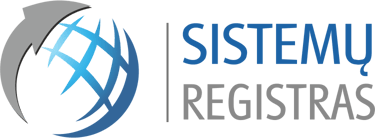ISO (International Organization for Standardization) – management system models developed by this international standardization organization are based on 8 quality management principles:
Customer focus
Leadership
Engagement of people
Process approach
System approach to management
Continual improvement
Factual approach to decision making
Mutually beneficial relationships with suppliers
UAB “Sistemų registras” provides certification services for the management systems listed below, as well as others, in accordance with ISO standards:
ISO 9001 Quality Management Systems
ISO 9001 is a fundamental quality management system standard that outlines internationally recognized quality management requirements.
Organizations that seek higher operational efficiency, more precise process control, clearer distribution of responsibilities, continuous improvement, and traceability of activities often choose to follow the principles of the ISO 9001 standard.
Any organization, regardless of its legal status, size, or field of activity, can pursue certification of its quality management system in accordance with ISO 9001 requirements.
Compliance with ISO 9001 demonstrates that the organization prioritizes the quality of its services or products.
ISO 14001 – Environmental Management Systems
This standard defines the fundamental requirements for organizations seeking to operate their business sustainably. ISO 14001 covers the identification of an organization’s environmental impact, the evaluation of that impact, and the establishment and assessment of environmental management measures.
As Europe embraces the Green Deal and society and governments set increasingly high expectations for environmental protection, pollution prevention, and the responsible use of energy and natural resources, implementing ISO 14001 can serve both as an initial tool to identify an organization’s environmental footprint and as a long-term framework to manage and reduce that impact.
In Lithuania, the Minister of Environment has officially recognized compliance with ISO 14001 as one of the criteria for participating in green public procurement.
Any organization — regardless of its legal status, size, or field of activity — can pursue certification of an environmental management system in accordance with ISO 14001.
Compliance with ISO 14001 demonstrates an organization’s responsible and sustainable approach to the environment, and certification creates additional opportunities, especially in the area of green procurement.
ISO 45001 – Occupational Health and Safety Management Systems
An Occupational Health and Safety Management System that complies with the ISO 45001 standard demonstrates that the organization systematically addresses health and safety issues, identifies and manages workplace hazards, and implements preventive measures to avoid accidents and incidents. All of this helps ensure safe and healthy working conditions for employees.
Any organization — regardless of its legal status, size, or area of activity — can seek certification of its occupational health and safety management system in accordance with ISO 45001 requirements.
Compliance with ISO 45001 shows that the safety and well-being of employees and other individuals working in the organization’s environment is a top priority.
ISO/IEC 27001 – Information Technology – Security Techniques – Information Security Management Systems
The requirements set out in this international standard are generic and can be applied to any organization, regardless of its type, size, or field of activity.
Certification of this system demonstrates the organization’s responsible approach to managing client data and ensuring its confidentiality and security.
ISO/IEC 20000 – Information Technology – Service Management
This is the standard for IT service management.
As the use of information technologies continues to expand across various business sectors, effective and reliable IT service management has become an essential part of business success.
The standard outlines the requirements that organizations must implement in order to consistently manage both internal and external IT services.
These requirements cover planning, development, delivery, and improvement of services, aiming to meet the defined service expectations.
The requirements of the standard are generic in nature and are intended to be applicable to all organizations, regardless of their legal status, size, or the type of services they provide.
ISO 50001 – Energy Management Systems
This management system is designed for organizations aiming to manage energy resources efficiently and effectively, reduce related costs, explore alternative energy sources, or find ways to utilize surplus energy more efficiently.
Any organization — regardless of its legal status, size, or area of activity — can pursue certification of its energy management system in accordance with the ISO 50001 standard.
ISO 17100 – Translation Services
This standard is intended for translation service providers seeking to demonstrate that the services they deliver comply with the requirements of an international translation services standard.
ISO 37001 – Anti-Bribery Management Systems
This management system is intended for organizations that support and promote transparent cooperation principlesand seek to establish, implement, maintain, and improve anti-bribery measures.
The system is relevant to organizations in both the public and private sectors.
ISO 22000 – Food Safety Management Systems
A food safety management system can be certified in any organization involved in the food safety assurance chain—from suppliers of sanitary or packaging materials that come into contact with food, to food and feed producers, and even farmers.
Even the smallest consumer complaint regarding food safety or quality can harm an organization’s reputation. Therefore, it is crucial to identify food safety control points at every stage of the production process and apply control methods to ensure that all food safety and quality assurance measures are implemented throughout the entire production chain.
EN 15593 Pakuotės. Higienos vadyba gaminant maisto gaminių pakuotes
Ensuring the safety of food-contact packaging is just as important as ensuring the safety of the food itself, as unsafe packaging can be a carrier of harmful pathogens.
The connection between members of the food packaging chain is essential to ensure that all hygiene-related hazards are identified and properly managed.
Packaging hygiene is a shared responsibility, primarily ensured through the coordinated efforts of all parties involved in the packaging chain.
Others
UAB “Sistemų registras” can also certify other management systems based on management system or good manufacturing practice (GMP) standards, such as ISO 28001, ISO 22716, and others.
